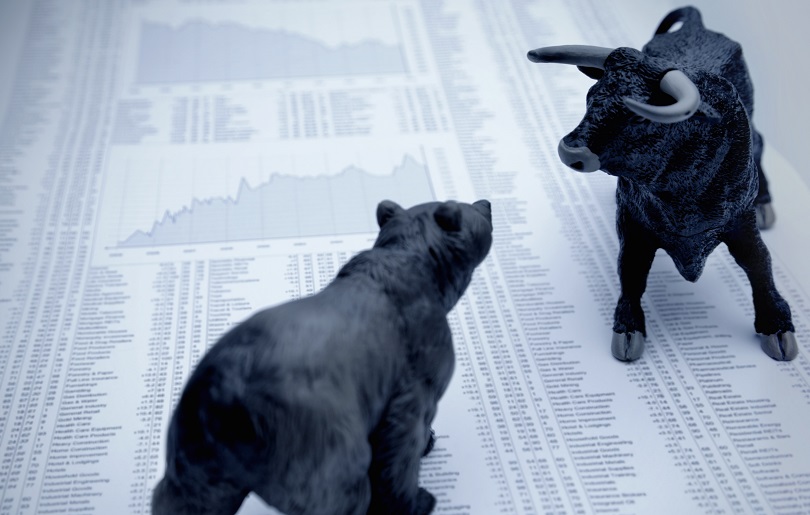As markets have slumped further into the year amid warnings of recession on the way and inflation misses, some investors have been voting with their feet and pulling money from passive providers.
BlackRock’s UK-domiciled funds have suffered progressively bigger net outflows since February, according to estimates from Morningstar. In April, it was hit by a record £1.2bn of net redemptions, more than double the month before.
Aside from a “rare net outflow” in February, Vanguard’s monthly flows have been positive so far this year.
In April, it took in £719m of client cash, though Morningstar noted this was helped by strong demand for its Lifestrategy range, which only invests in other Vanguard products.
‘Passive investing will be less effective as cost of capital rises’
David Coombs, head of multi-asset investments at Rathbones, uses ETFs to tactically add to risk positions on “big down days”, assuming liquidity is good, but avoids them when executing long-term strategic views.
“Passive funds are forced sellers in falling markets if they experience negative flows. They have to sell every holding – no discretion – so they are price takers. If liquidity is poor this is exacerbated.”
He adds: “Taking a longer-term view, I think passive investing will be less effective over the next five years as the cost of capital rises creating a bigger gulf between the strong and the weak”.
Inconsistent active managers
Active managers boast about being the better option in a tough market, but, collectively, their recent track record leaves much to be desired.
The first quarter of 2022 saw the smallest number of funds in over a decade generate top-quartile returns over three consecutive 12-month periods, according to the latest BMO Global Asset Management Multi-Manager FundWatch survey.
Just five of the 1,115 funds in the 12 sectors researched achieved top-quartile returns consistently over a three-year period as at the end of Q1 2022.
Rob Burdett, head of the BMO GAM’s multi-manager team, says: “The number of funds consistently achieving top returns fell dramatically in Q1 2022 due to the significant impact of the war in Ukraine, and the geopolitical effect on resource supply”.
He explains that in the past three years that the FundWatch survey covers, several significant events have impacted funds – Covid, a return to inflation and the longer-term effects of climate change and related ESG considerations.
“The war in the Ukraine is the latest in market shocks, with the resulting sanctions having a significant impact on commodities, inflation and interest rates, as well as the impact at a sector level, with knock on effects for defence and energy stocks”.
Burdett adds: “These crises have caused significant gyrations in financial markets and underlying asset classes, resulting in the lowest consistency figures we have ever seen in the survey”.
See also: Active equity funds still charging too much despite 15% drop in annual fees in four years
Fund selection matters
“A lot of active managers don’t help themselves because they buy stuff in the index just so they aren’t too wide of the index,” Andy Merricks, fund manager at 8AM Global, says. “And in some instances, they are told the strict parameters in which they can work, which can be limiting.”
Although “people get all evangelical about passive versus active,” Merricks says there is an argument for both. That said, investors must be choosy with their selections.
“In our fund we buy sector ETFs, such as the S&P Energy ETF, but we wouldn’t buy an S&P 500 ETF,” he explains. “You have to be selective yourself on what an active manager is doing at any given time – they won’t always outperform in every cycle.”
However, there are some areas of the market where active managers have a clear advantage.
“Buying small-cap trackers is not a good way to use passives. The same applies with fixed interest,” he says.
“Managers should be able to add value here by being active and if they don’t, questions should be asked.”
Why have active managers done so poorly in Q1?
Jason Hollands, managing director of corporate affairs at Smith & Williamson, says that, in theory, active managers should have an advantage in a down market versus index trackers.
“Whether by design, for instance moving into defensive sectors or raising cash weightings, or inadvertently as most active funds naturally carry an element of cash waiting to be deployed (whereas index funds are fully invested)”.
However, Hollands agrees with Burdett that there may be a few factors at play during the first quarter adding to the disappointing run.
“Firstly, some of the best performing parts of the market during this period have been in ESG-pariah sectors – energy, commodities, tobacco and defence stocks – which are under-owned by active managers given the embrace of ESG.
“Secondly, there has been a very wide performance differential in favour of value over growth so far this year – and value funds have become less numerous over the last decade”.
What does 2022 and beyond hold in store?
Undoubtedly markets now face considerable uncertainty with regards to the direction of economies and inflation pressures.
There is an argument that passive funds may find it hard to outperform against the best active funds, which have more flexibility to take advantage of buying opportunities as they arise.










